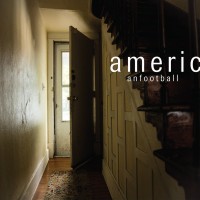
American Football
American Football (1999)
Jordan Rogowski
Mike Kinsella has done a lot of good in the world of music. From his work in Cap'n Jazz to Owls and Joan Of Arc, to his most recent project Owen, the man is just as versatile as he is talented. Immensely. He doesn't always have to be the centerpiece of the band, as he only handled guitar duties in Joan Of Arc, and he's played drums, bass, and keyboards at one time or another. The man has truly done it all.
In 1999, Kinsella joined up with guitarist Steve Holmes and drummer/trumpet player Steve Lamos. The result of this collaboration was the self-titled masterpiece, American Football. The result of such diverse musicians coming together is a blend of many influences, from jazzy tempos and earnest, heartfelt vocals, to clean, lulling guitars. This is a relaxing record, but it will retain your attention, rather than put you to sleep as some similiar bands often can. It's as engaging as it is honest, which very well might be it's most redeeming quality.
There's not a lot of Kinsella's vocals here, which, oddly enough, works in its favor, letting you get the full experience of the amazing instrumentation. The weird time signatures are especially prevalent throughout the duration of the record, but never fail to keep an interesting path through each song. The guitar textures keep everything at a fairly mellow pace throughout, though spots of a more up tempo American Football shine through on tracks like "I'll See You When We're Not Both So Emotional." This is one of the heavier tracks in terms of vocals, and keeps an engaging and captivating beat throughout. The tempos vary as well as the instruments themselves. "The One With The Wurlizter" showcases Lamos' skill on the trumpet. It gives the song a real authentic jazz sound, and really says a lot for the diversity of what this record can truly be. Whether the tempo is at a foot tapping pace, or a smooth, beautiful tone, the instrumentation is tight, and the songs crafted to perfection.
On par with the music itself are Kinsella's thoughtfully and intelligently constructed lyrics. There's a certain air of regret, not only felt in the vocals themselves, but exemplified by the lyrics. In "Never Meant," Kinsella sings "So let's just pretend / Everything and anything / Between you and me / Was never meant" with a definite feel of regret. You can feel each word coming out of the liner notes, and it only gets stronger when you hear the words put to music. I'm sure there are people who will complain that the lyrics are too "emo," in the Rolling Stone Magazine-calling-Dashboard-emo sense of the word. But these aren't the kind of lyrics you'll find in the newest Matchbook Romance CD, just being somber for the sake of it. This is emotion, and is well thought out. The lyrics almost seem like riddles at times, as in "For Sure;" "Imagine us together / We're relatively stable / And tentatively able / To say for certain / Whether this uncertainty is for sure," laments Kinsella. The lyrics are few and far between, but strategically placed. At the height of the music, you'll find the peak of Kinsella's lyrical brilliance. Like a chess game, he knows just where to put each piece for maximum effect.
This is a well, well made CD. If you're a fan of anything Kinsella has done, or are looking for a good place to start, my suggestion to you is to find a copy of this. It's a long way off from Cap'n Jazz, but it couldn't be in a better place.
Varying tempos, tight musicianship that will play off every emotion struck by the lulling chords, and the lyrics that paint every picture that was otherwise left out. This is a complete package.